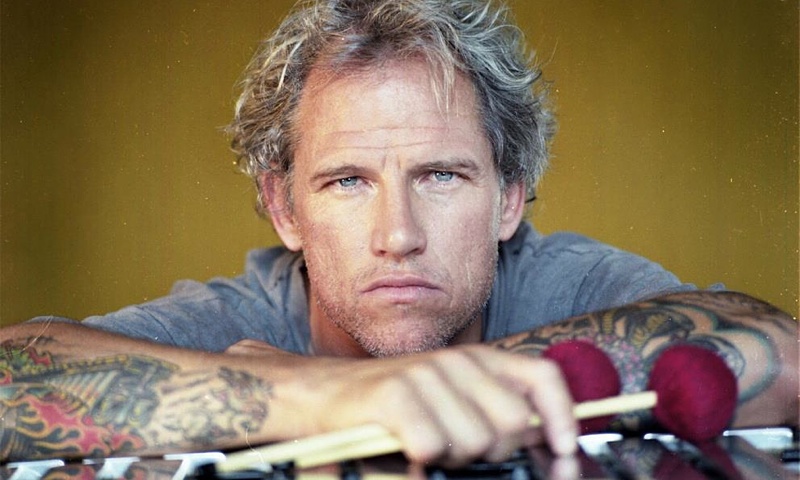Spotlight: Mike Dillon

Mike Dillon’s career is at once defined by collaboration and individuality. On one hand, the percussionist/vibraphonist has supported such esteemed acts as Galactic, Ani DiFranco, Les Claypool and Rickie Lee Jones while also leading his own Billy Goat, Hairy Apes BMX and Malachy Papers. On the other hand, Dillon’s route to a career in music has been a unique one; along the way, he has strived to chart his own course.
“Forging your individualistic path, I think, is extremely important,” Dillon says in the spring of 2021, a few weeks before his airstream and his wife’s small truck were hit by a stolen vehicle going 70 miles an hour while parked on the street. (Thankfully, no one was hurt, though the vehicles were totaled and a GoFundMe page has since been set up.)
Dillon notes that this singular path began with his instrument of choice. “When I started playing congas, not a lot of people were into the hand-percussion thing. Then all of a sudden, people are going to Cuba and studying rumba,” he explains. “Then I got into the vibes—I was like, ‘Alright, I gotta do something different.’”
During the pandemic, despite watching most of his live engagements vanish in a matter of weeks, Dillon has remained committed to his mantra of “doing something different.” While off the road last year, he created three full[1]length albums—Shoot the Moon, Suitcase Man and 1918—each of which was initially released through the “Bandcamp Fridays” campaign but are now also available on vinyl. The albums are far from uniform, showcasing Dillon’s varied interests as a percussionist and songwriter.
Shoot the Moon, the first of the three to be dropped into the world, is a punk[1]tinged, psychedelic odyssey that incorporates Dillon’s idiosyncratic vocals in an almost eerie way. The lyrics alternate between the surrealism of songs like “Camus Sound Asleep” (“Smoking Alone/ The lions are hungry for you/ Sirens scream/ Deafening crew”) and the political commentary baked into tracks like “Qool Aid Man” (“Pro life/ Pro God/ American Nazi/ What a façade”). In addition to his own playing, Dillon also employed the work of musicians such as Matt Chamberlain, Steven Bernstein and Nicholas Payton.
“We just started exchanging files,” Dillon says of the collaborative process. “It was very organic. And because we didn’t have time constraints— a.k.a. a tour to get to next week—we were able to take our time and listen to the songs. We didn’t have any other expectations other than to have fun with this and see who all gets involved.”
The second record released on Bandcamp, Suitcase Man, is a more solitary affair. While it does feature some guest background vocalists, the set is Dillon’s “singer-songwriter record,” as he puts it, focusing in on his vibraphone work and his ragged, but inviting voice. Dillon notes that he was particularly inspired by Tom Waits’ work, both sonically and vocally. “I’m an acquired taste when it comes to singing, and that’s OK,” he says with a laugh.
Dillon conceived Suitcase Man after he began working on the album’s title track. “I wrote that song as a direct reflection of what was going down. I was off the road for more than two weeks for the first time in 20 or 30 years,” he explains.
The unexpected downtime resulted in some of the percussionist’s most personal songs to date; on the record, his lyrics touch on intimate topics such as addiction, loss and depression.
“This was the first time that I had time to sit around and really try to process a lot of stuff,” Dillon says.
Yet, the instrumental[1]focused 1918, which dropped last December, may be Dillon’s true “pandemic release.” Though largely focused on Dillon’s vibraphone, tabla and synth work, the album does include some tongue-in-cheek commentary about the age of COVID-19, like the curiously titled “Quarantine Booty Call.”
“That was a happy accident,” Dillon says of 1918, which features drummer Earl Harvin and guitarist Shane Theriot, among others. “Until the week we put the record together, I was still coming up with titles for some of the instrumentals. I was just like, ‘Alright, I’m gonna make this the record all about the pandemic.’ ‘Quarantine Booty Call’ is a ‘have fun’ song.”
For all three records, Dillon worked with producer and longtime-collaborator Chad Meise to create the basic tracks; the two hunkered down in a studio over the summer, making sure to keep the sessions “COVID-safe.”
“[Chad was] like, ‘Alright, I’ll stay in the control room with a mask. You stay in the tracking room. We won’t have any contact with you,’” Dillon recalls. “And that’s what we did. We didn’t have any contact.”
Initially, Dillon did not plan to release his burst of new material as three distinct albums. “I would say, by July, I was like, ‘Wow, I’m gonna have a really cool electric record and a really cool acoustic record,” he says. “My initial goal was to put the best songs on the electric record.”
However, his label, Royal Potato Family, was ultimately game to issue three albums, so Dillon quickly pushed out nearly all the songs he had in the hopper. Indeed, each record is a complete and well[1]defined statement; as a series, they present a full picture of Mike Dillon as an artist.
As the percussionist, and the music world at large, prepares to return to some form of normalcy, Dillon is optimistic about the revitalization of the industry post-COVID: “I feel like—and not just in terms of my music and my friends— there’s going to be so much great music and regeneration that has come from all that we have gone through the past year and a half.”




















